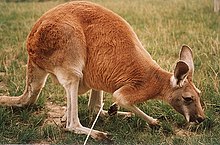
Grazing is a method of feeding in which a herbivore feeds on low-growing plants such as grasses or other multicellular organisms, such as algae. Many species of animals can be said to be grazers, from large animals such as hippopotamuses to small aquatic snails. Grazing behaviour is a type of feeding strategy within the ecology of a species. Specific grazing strategies include graminivory (eating grasses); coprophagy (producing part-digested pellets which are reingested); pseudoruminant (having a multi-chambered stomach but not chewing the cud); and grazing on plants other than grass, such as on marine algae.
Grazing's ecological effects can include redistributing nutrients, keeping grasslands open or favouring a particular species over another.